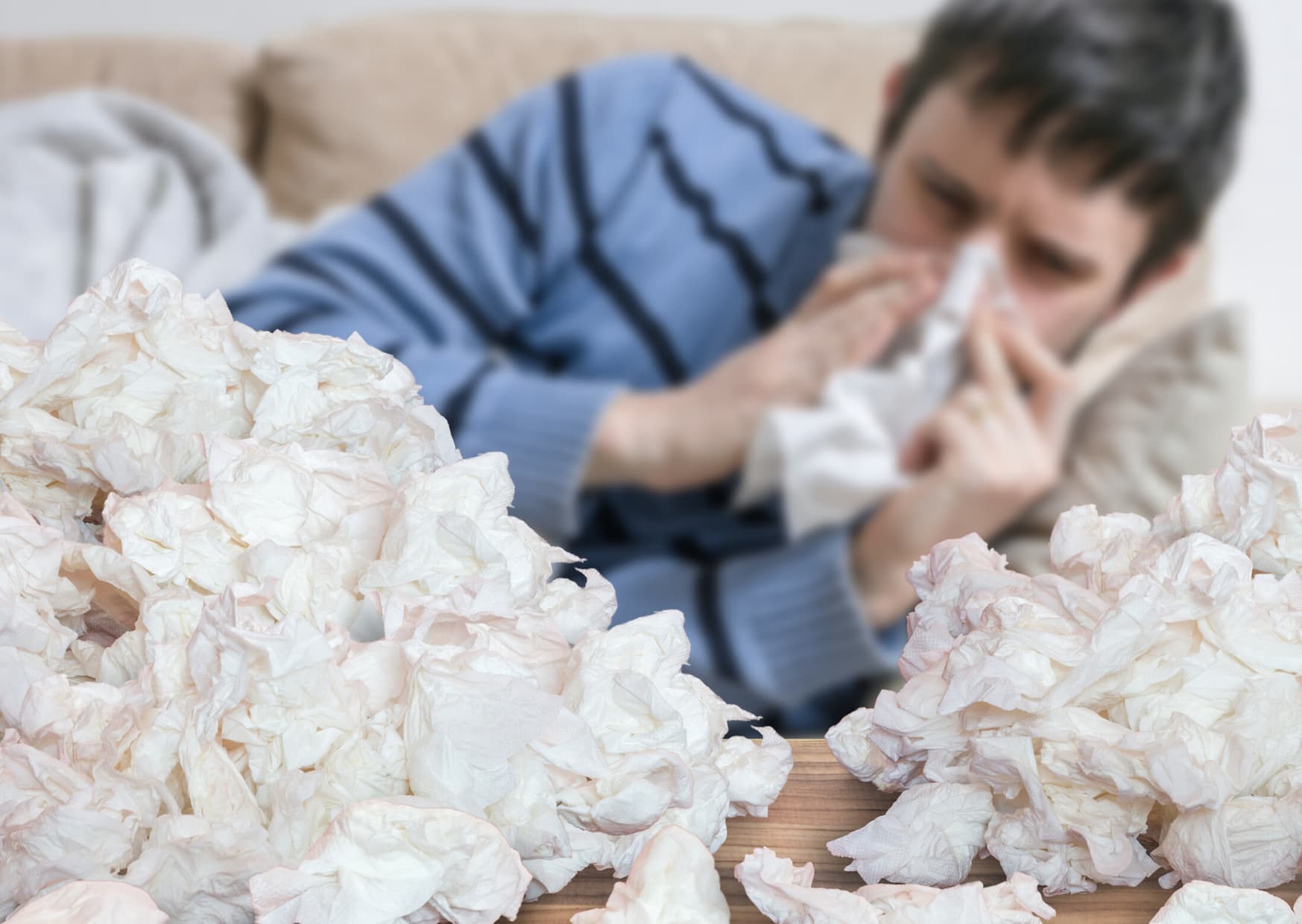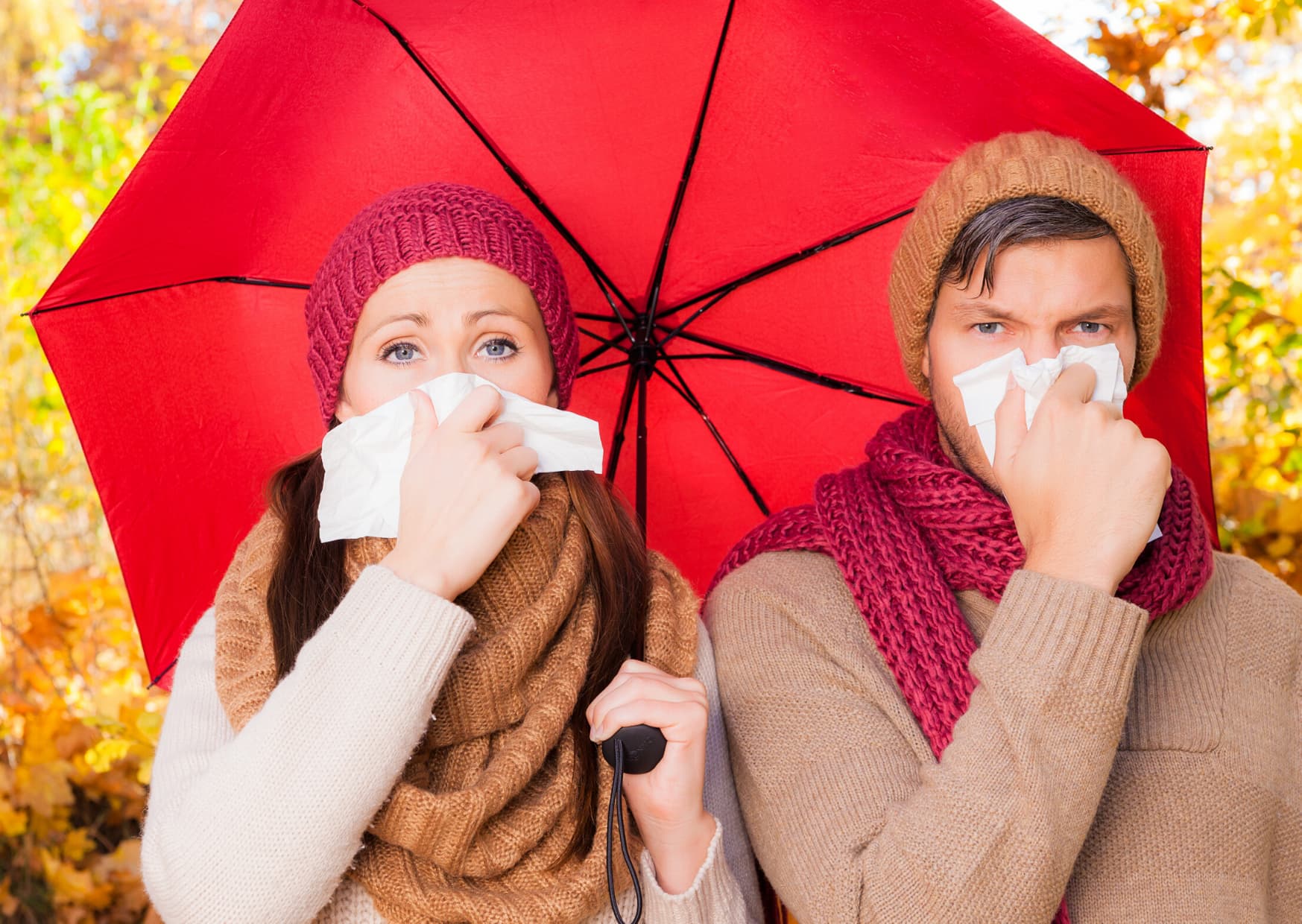Rhinitis
Inflammatory process of the nasal mucosa characterized by the following clinical symptoms: runny nose, sneezing, nasal congestion or itching (itchy nose).
Classification
Rhinitis is classified as allergic rhinitis (AR) and non-allergic rhinitis.
Allergic rhinitis
Allergic rhinitis is inflammation of the inside of the nose caused by an allergen, such as pollen, dust, mold, or the skin flakes of certain animals.
Allergic rhinitis usually causes cold-like symptoms, such as sneezing, itching, and a runny nose. These symptoms usually start shortly after being exposed to an allergen (the substance that causes the allergic reaction).
Some people only have allergic rhinitis for a few months because they are sensitive to seasonal allergens, such as pollen or grass. Other people have allergic rhinitis throughout the year.
Most people with allergic rhinitis have mild symptoms that can be easily and effectively treated. But for some people, the symptoms can be severe and persistent, causing trouble sleeping and interfering with everyday life. Allergic rhinitis symptoms occasionally improve over time, but this can take many years and the condition is unlikely to go away completely.
Allergic rhinitis is caused by the immune system reacting to an allergen as if it were harmful. This results in cells releasing a number of chemicals that cause the inner lining of the nose (the mucous membrane) to swell and produce too much mucus.

Prevention and treatment
Although it is not easy, you should avoid possible allergens, which you know or suspect are causing allergic rhinitis. If the symptoms are mild, antihistamines are usually prescribed and recommended, it is also advisable to humidify and wash the nasal passages with saline solution.
In more severe cases, corticosteroids are used.
When symptoms are severe or significantly reduce the quality of life, vaccination is recommended. Vaccines normally contain a small (and gradually increasing) amount of an allergen mixture. Over time, the body recognizes the allergen and no longer reacts to it.
Complications
Allergic rhinitis can lead to complications in some cases.
- Nasal polyps: abnormal (benign) growth of tissue within the nasal passages and sinuses.
- Sinusitis (rhinosinusitis): an infection caused by nasal swelling and inflammation that prevents mucus from draining from the sinuses and leads to nasal congestion, runny nose, facial pain, and decreased or loss of smell.
- Infections of the middle ear: infection of the part of the ear located directly behind the eardrum.
These complications are treated medically, although surgery is required in some cases.
NON-allergic rhinitis
“Non-allergic rhinitis” is the medical term used to describe the following symptoms when they occur without a known allergic cause for weeks or months for at least a year:
- Sneezing
- Runny nose
- Stuffy nose (congestion)
- Post nasal drip
Symptoms are generally present throughout the year, although they can be made worse by certain weather conditions (for example, those that accompany seasonal changes). Unlike allergic rhinitis, non-allergic rhinitis does not affect the immune system.
What Causes Non-allergic Rhinitis?
Nonallergic rhinitis can occur as a result of:
Viral diseases
- For example, the cold.
Environmental factors
- Tobacco
- Perfumes
- Paint fumes
- Changes in temperature
- Stress
Hormonal imbalances
- Puberty
- Pregnancy
- Hormonal medications, such as birth control pills
Medicines
- Overuse of nasal decongestants
- ACE inhibitors to treat high blood pressure
- Non-steroidal anti-inflammatory drugs (NSAIDs), for example ibuprofen

Treatment
Non-allergic rhinitis is usually not harmful, but it can be bothersome and significantly affect quality of life. Treatment depends on the severity of the rhinitis and the cause.
In some cases, avoid certain triggers and take self-care measures, such as cleaning and humidifying the nasal passages with saline solution. In other cases, you must take a medication, such as nasal sprays that contain corticosteroids.
Complications
Non-allergic rhinitis can also cause complications:
- Nasal polyps
- Sinusitis (rhinosinusitis)
- Infections of the middle ear
Diagnosis of AR and non-allergic rhinitis
Diagnosis of rhinitis is based on physical examination and review of medical history. In some cases, tests are done to confirm or rule out the diagnosis.
Your doctor may recommend allergy tests. The most widely used allergy tests are a skin prick test in which the skin is exposed to small amounts of specific allergens. They are fast and reliable tests.
Frequently Asked Questions about rhinitis
Who develops allergies?
Allergies can affect anyone, regardless of age, gender, race, or socioeconomic status. While it is true that allergies are more common in children, they can occur for the first time at any age or, in some cases, return after many years of remission.
Although the exact genetic factors are not yet understood, the tendency to allergies, as well as to allergic diseases, is related to heredity.
What Causes an Allergic Reaction?
Hundreds or even thousands of ordinary substances can trigger allergic reactions. These are called “allergens”. Among the most common are plant pollen, mold, house dust (dust mites), animal dander, industrial chemicals, food, medicine, and insect bites.
An allergic reaction can occur anywhere in the body, but it usually appears on the skin, eyes, stomach lining, nose, sinuses, throat, and lungs – places where special immune system cells are placed to fight the invaders that are inhaled and swallowed, or come into contact with the skin.
What is hay fever?
“Hay fever” is a term from the beginning of the last century that has come to describe the symptoms of allergic rhinitis, especially when it occurs in late summer. However, the symptoms are not caused by hay (ragweed is one of the main culprits) and are not accompanied by a fever. Therefore, doctors prefer the term “allergic rhinitis” because it is more accurate.
Is allergic rhinitis the cause of other problems?
Some known complications include ear infections, sinusitis, recurrent sore throat, cough, headache, fatigue, irritability, disturbed sleep patterns, and poor school performance.
Occasionally, children can develop facial growth disturbances and orthodontic problems. Allergy treatment can eliminate or alleviate most of these problems.
If I have rhinitis, will I have asthma?
Not necessarily, but people with rhinitis are 5 times more likely to have asthma. Early treatment of rhinitis can prevent the onset or severity of asthma.
How do I distinguish rhinitis from a common cold?
The common cold and allergic rhinitis are distinguished by the frequency and duration of symptoms.
The symptoms common to both conditions are: sneezing, clear mucus and an itchy or blocked nose. However, in the case of colds they do not last more than 15 days, and there may be between two and four episodes over the course of the year. In addition, there may be fever and headache. By contrast, in allergic rhinitis the symptoms are more persistent and prolonged over time and may be present throughout the year. In this case, bilateral nasal obstruction is characteristic.
Are allergy shots effective?
Efficacy depends on a good personalized diagnosis and an appropriate choice of vaccine for each patient.
Allergy symptoms won’t go away overnight. They usually improve during the first year of treatment, but the most noticeable improvement usually occurs during the second year. By the third year, most people are no longer sensitive to the allergens in vaccines and no longer have significant allergic reactions to these substances.
What side effects can I get from allergy shots?
Today’s allergen vaccines are very safe, but reactions can still occur. The most common are local reactions, which occur at the injection site or, if they are sublingual, in the mouth. Itching, stinging and increased volume in the area of the puncture are usually the most common symptoms.
Also, although rare, there may be systemic reactions, that is, they affect the whole body, causing rhinitis, asthma, urticaria, etc.
What is allergic conjunctivitis?
Allergic conjunctivitis is a disease commonly associated with allergic rhinitis, in which case it is called allergic rhinoconjunctivitis. Symptoms include watery, itchy, and stinging eyes, as well as congestion and redness.
Allergic conjunctivitis occurs more often with outdoor allergens (pollens and molds) than indoors.
Is allergic rhinitis very common?
Allergic rhinitis represents a global health problem, since it affects 10-25% of the population, and in some countries it reaches up to 40%, especially in seasonal allergic rhinitis.
Nasodren® is a 100% natural, effective and safe spray for the relief of sinusitis symptoms that can accompany allergic rhinitis. Find relief from the first application.


